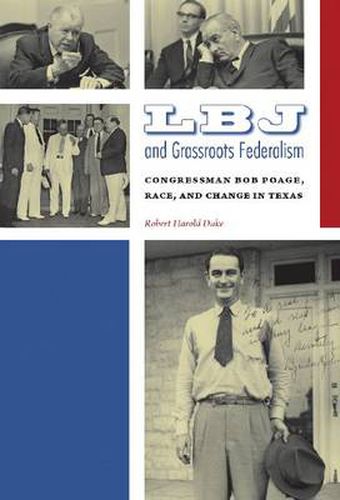Readings Newsletter
Become a Readings Member to make your shopping experience even easier.
Sign in or sign up for free!
You’re not far away from qualifying for FREE standard shipping within Australia
You’ve qualified for FREE standard shipping within Australia
The cart is loading…






LBJ and Grassroots Federalism: Congressman Bob Poage, Race, and Change in Texas reveals the local ramifications of federal policy. Three case studies in the rising career of Lyndon B. Johnson show this in action: LBJ’s formative experience as a New Dealer directing the National Youth Administration (NYA) in Texas; his key role as senate majority leader in breaking the deadlock to secure funds for the Lake Waco dam project; and the cumulative effect of his Great Society policies on urban renewal and educational reform among the Mexican American community in Waco.
In each of these initiatives, Bob Poage-though far more politically conservative than Johnson-served as a conduit between LBJ and citizen activists in Poage’s congressional district, affirming the significance of grassroots engagement even during an era usually associated with centralization.
Robert Harold Duke’s careful analysis in LBJ and Grassroots Federalism also offers a unique insight into a transformational period when the federal government broke down barriers and opened doors to the engagement of African Americans and Mexican Americans in community planning processes and social policy.
$9.00 standard shipping within Australia
FREE standard shipping within Australia for orders over $100.00
Express & International shipping calculated at checkout
LBJ and Grassroots Federalism: Congressman Bob Poage, Race, and Change in Texas reveals the local ramifications of federal policy. Three case studies in the rising career of Lyndon B. Johnson show this in action: LBJ’s formative experience as a New Dealer directing the National Youth Administration (NYA) in Texas; his key role as senate majority leader in breaking the deadlock to secure funds for the Lake Waco dam project; and the cumulative effect of his Great Society policies on urban renewal and educational reform among the Mexican American community in Waco.
In each of these initiatives, Bob Poage-though far more politically conservative than Johnson-served as a conduit between LBJ and citizen activists in Poage’s congressional district, affirming the significance of grassroots engagement even during an era usually associated with centralization.
Robert Harold Duke’s careful analysis in LBJ and Grassroots Federalism also offers a unique insight into a transformational period when the federal government broke down barriers and opened doors to the engagement of African Americans and Mexican Americans in community planning processes and social policy.